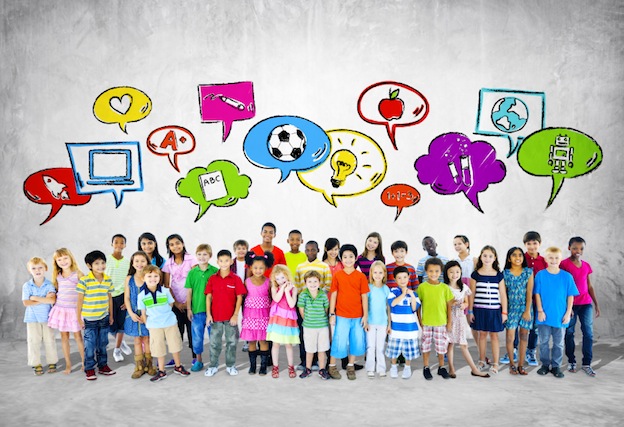SingaporeMotherhood | Parenting
October 2014
The Importance of Early Childhood Education

Today marks the launch of Startwell, a campaign initiated by the Lien Foundation to help children in Singapore have a happy childhood, to support parents in bringing up their children as well as preschool teachers who shape and mould our children’s early education.
The concept of early childhood education started in the early 1800’s. This progressed through evolution, research, amendments, and legislation and includes preschools, daycare centres, and nurseries today.
[banner][/banner]
Across the world, governments allocate budgets, establish national agencies, and legislation to oversee the implementation of early childhood education initiatives. Curriculums based on different developmental theories have also made their way into many classrooms around the world today. Chances are that your child’s kindergarten has already adopted one (or more) of these!
The Push
Over the years, researchers have determined that 85 per cent of the brain develops before age five and concluded that most of the brain’s growth occurs within the first two years of life. During this time, brain synapses are formed at an amazing rate – they are created in response to the child’s environment. As such, stimulation and interactions are vital to develop such brain connections. This conclusion has great implications for advocates to push for early childhood education.
Who’s in the Industry?
Today, there is a wide support from national agencies to serve the development of early childhood education. These include:
– Early Childhood Development Agency
– Association For Early Childhood Educators Singapore
– Child Care Link
– The Association of Early Childhood and Training Services
– Preschools Connect
– Singapore Committee of OMEP
Childhood Education Providers:
– Seed Institute
– National Institute of Education Singapore
– Singapore Workforce Development Agency
How does Early Education Accelerate Children’s Development?
Physical
Early childhood education helps children to develop physically. Children develop gross motor skills like walking, running, and coordination during classroom activities, strengthening their muscles. The development of fine motor skills like holding pencils, grasping objects, and picking up food items is also encouraged.
Social
Children acquire social skills that help them to make friends. In the early learning environment, children are encouraged to develop interpersonal and communication skills which help them to establish friendships. They learn to accept others and get along with their peers during play. Social skills are necessary for school – without them, children will not feel like they belong in their environment. Early childhood education provides social interaction opportunities for children.
Emotional
The early learning environment provides scenarios for children to experiment, explore and manage emotions like empathy, compassion, and sharing. Such opportunities also enable children to learn how to express their emotions (or acquire emotional intelligence). In the early learning environment, role playing and observation provides opportunities for children to demonstrate their expressions and imitate others.
Cognitive
Intellectual development is fundamentally important for children and it is associated with memory, reasoning and thinking. Jean Piaget (a renowned childhood development theorist in the 1960s) highlighted the different stages of sensorimotor, pre-operational, concrete and formal operational development that children go through to achieve mental growth. Based on this knowledge, early childhood curriculum have been designed to enable children to attain cognitive achievements which are essential for school readiness.
The Bigger Picture
Children’s Development
There are enormous developmental benefits in exposing children to a professionally guided, play-based, learning experience before entering school, Helen Davis, Programme Director for the University of California Los Angeles (UCLA) Extension’s Early Childhood Education division, told us, adding that “an early childhood education experience also promotes exploratory learning in the content areas such as science, math, literacy, and arts.”
Early childhood education has a direct link to children’s physical, social, emotional, and cognitive development. Children who are exposed to early learning programmes tend to be equipped with better social and learning skills. They also have enhanced attention spans, go on to obtain better grades, and graduate at higher institutions. These children, who are more capable of managing themselves, also have fewer behavioural problems.
The benefits are enhanced if the educator is a dedicated one. “A thoughtful teacher will support a child’s executive functioning skills such as self-regulation, empathy, planning, and perspective-taking,” she added.
Societies’ Benefits
Societies also benefit when children go through early education programmes as such initiatives propel them to move towards early academic standards. Pre-kindergarten programmes pay off in the long run by reducing the teen incarceration rate, lowering the crime rate, lessening welfare reliance and unemployment, and creating potential solutions for the future workforce.
Early childhood education also enables children of impoverished families to break from cycles of poverty and inequality through learning and education. These children are more likely to stay engaged in the society, earn a reasonable income, graduate, own homes, and stay in marriages. Early exposure to learning at preschool, and kindergarten is therefore important – the returns to society can be achieved on many levels.
There is a Difference
Mainstream educators can see the difference in children who graduate from the preschool and pre-kindergarten environment. These children have been exposed to learning based on established developmental theories. Their ability to construct knowledge and acquire experience through social interaction and play based on their intrinsic “need- to-know” mindsets actually drive their learning during the critical early years.
The long term benefits are apparent.
For children, there is the opportunity to push early childhood education to those under five years old as it encourages their physical, social, emotional and cognitive development.
For society, early education helps reduce the burden on welfare, lessen crime and unemployment in the long run, and propel children who are less privileged to move forward and become successful later on in their lives. Such unambiguous economic advantages encourage many advocates to believe in long haul investment in early education and as such, they work together with the government, communities, educators, and families to make developmentally appropriate curriculum accessible to all children.
Early childhood education nurtures the young, and an immersion in such developmental programmes will ensure that all children will be ready to face the world in time to come.
Do you think early childhood education is important? What do you want to see in your child’s preschool? How do you think preschool education in Singapore can improve? Join in the initiate to give your children the best start in life! Take the pledge at Startwell and follow the Startwell Facebook page to get updates on events and ideas on how to reclaim the Singapore Childhood. See you there!
All content from this article, including images, cannot be reproduced without credits or written permission from SingaporeMotherhood.
Follow us on Facebook, Instagram, and Telegram for the latest article and promotion updates.






